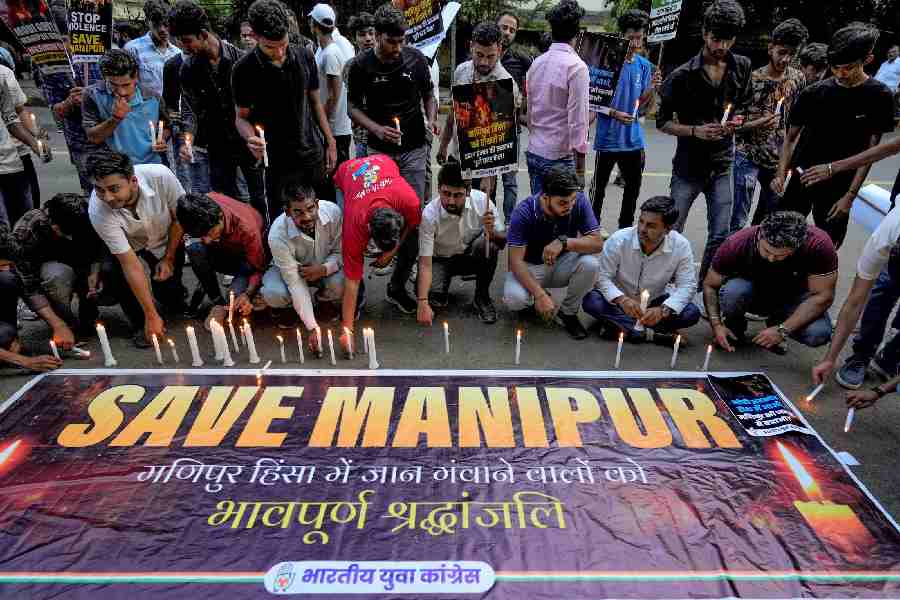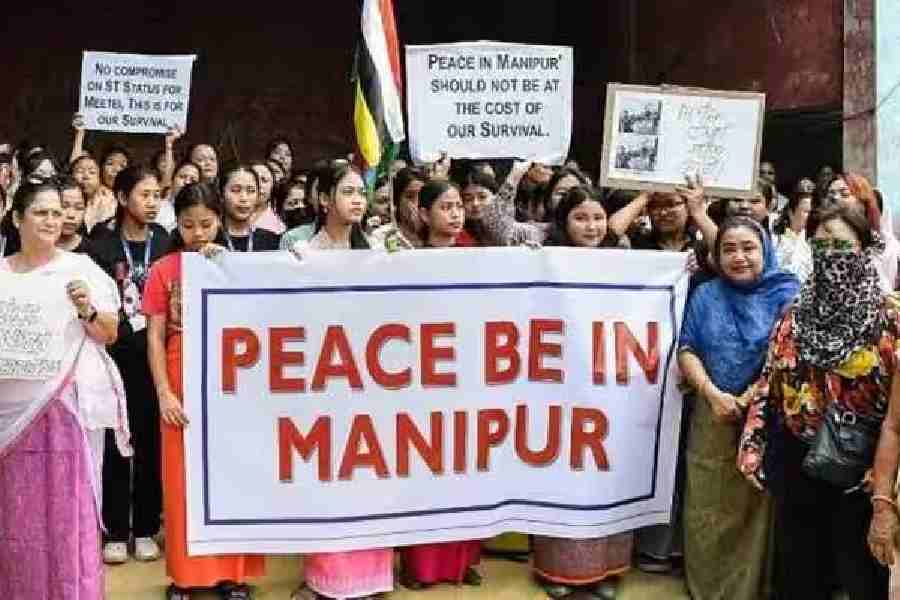A health department official in Manipur has written to a Church elder seeking his help to procure “much-needed” medicines and other essentials for the relief camps in Churachandpur district.
The July 13 letter reflects a sense of “helplessness” and “embarrassment” among officials, doctors and relief workers in Manipur at their inability to provide timely help to the sick in the relief camps, an official told The Telegraph.
Many relief workers have told this newspaper that while the Internet ban, in place since the violence began on May 3, makes it difficult to order and pay for medicines and medical equipment, the unruly highways hamper deliveries.
The letter to Father Varghese Velickakam, vicar-general and convener of the relief and rehabilitation committee of the Imphal Diocese, provides a list of 18 medicines and the quantities required, ranging from 100 to 500 strips and 60 to 150 bottles each.
The medicines include such basic ones as the antacid Digene, paracetamol, eye and ear drops, Neurobion (vitamin combination), zinc sulphate (dietary supplement) and azithromycin (antibiotic).
The letter expresses "gratitude" to the Diocesan Social Service Society, Imphal, for the "much-needed medicines for all relief camps under Churachandpur district" that it had supplied on July 11.
Churachandpur is about 62km from state capital Imphal, its 112 relief camps sheltering more than 15,000 displaced people. The violence between the Meiteis — mostly Hindus and concentrated in the valley — and the largely Christian and hills-dwelling tribal Kukis has claimed at least 152 lives and displaced 60,000 people.
Fr Varghese confirmed receiving the letter and said that efforts were on to help in whatever way possible the relief camp inmates in the restive hills as well as the valley, where the situation is relatively better.
“It’s not only Churachandpur, there’s a problem with supplying medicines to Chandel and Tengnoupal hill districts, too, because of the road blockades and checking by ‘volunteers’ and ‘protesters’ who are not allowing the movement of goods," Fr Varghese said.
He said the government should somehow get these blockades lifted for the smooth supply of essentials, including medicines.
A health official told this newspaper that the government was allotting medicines but in “very minimal” quantities, and that it was “difficult” to get the consignments to Churachandpur from Imphal because of “security issues”. Churachandpur is a Kuki-Zo-majority district.
“We have till now received five consignments from the government since the violence erupted on May 3, the last one a small carton sent by helicopter last Wednesday since it was too risky to despatch it by road. We are seeking help to tide us over the crisis," the official said.
“Second, we lack the funds to make local purchases. We are managing by pooling funds from other sources. Our relief teams feel helpless and embarrassed when we are unable to help or treat the ailing in the camps in time.”
Sources said that even relief workers and security personnel are “checked” by the “volunteers” and not allowed to carry much, reflecting the distrust and animosity on the ground between Meiteis and Kukis.
It’s become practically impossible for people from either community to venture into the other’s territory, a valley-based Red Cross official said.
“We have been able to send relief to Kangpokpi (a hill district) with the help of our Senapati unit but we cannot reach Churachandpur. It’s very risky,” he said.
The Nagas, who are the majority in Senapati, have remained “neutral” in the conflict.
The Red Cross official said that governor Anusuiya Uikey had, at the annual general meeting of the Indian Red Cross Society in Delhi on Monday, urged Union health minister Mansukh Mandaviya to help with relief.
“The Red Cross is discussing how to boost relief support, including the use of helicopters to send medicines. The government, NGOs and community organisations all have to work together,” he said.
Asked why the Red Cross was not already using helicopters to send medicines, the official said there was a question of affordability. “But we are exploring every possibility to ensure smooth supplies,” he added.
The Union health minister is the chairman of the Indian Red Cross Society, a voluntary humanitarian organisation with 1,100 branches across India that provides relief during disasters and emergencies besides promoting health and the care of vulnerable people and communities.
An official meeting chaired by chief minister N. Biren Singh on Tuesday condemned the killings of innocent people and expressed “deep concern” at the blocking of highways by certain groups. An official statement promised stern action.












